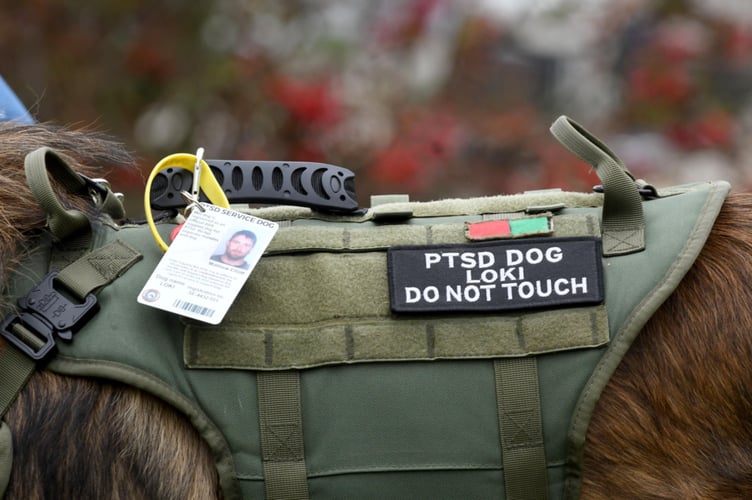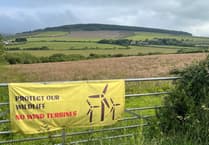Matthew Elliott served as a Saxon armoured vehicle/ambulance commander in Iraq in 2006-2007, where he was attached to a field hospital.
What most affected him was transporting the casualties who had suffered serious injuries.
’My wife says that when I got back from Iraq I wasn’t the same as I was when I left,’ Matthew explained.
He said that his past dog Devon had ’sensed’ this - that all was not normal with his state of mind.
’After I left the army, any time I was angry, [or] annoyed, upset in any sort of way, he wouldn’t leave my side,’ he said.
Some research has shown that trained dogs can lessen symptoms of PTSD among military veterans.
The 23 Pioneer Regiment veteran said that losing his previous dog of old age hit him hard and ’felt like losing a limb’ - after he had been by his side throughout his problems.
’Dogs don’t discriminate, they don’t say to you "shut up, go away", that sort of thing - they’re there - they do their bit,’ Matthew added.
Loki was then adopted as a rescue dog at four months old, having originally lived in Romania and previously being named Derek.
Matthew, who lives in Port Erin, said that it was nice to be able to watch Loki, a Carpathian Shepherd, grow up, which he had not been able to do with his old dog - having been busy in the army on exercises and living in the structured military lifestyle.
His initial training as a puppy was done with the Manx-based Wetnose Dog Company.
Loki was then certified as a PTSD dog through an American company, which means that he now wears a special card to indicate that he is a service animal.
The process required Matthew to prove that he had served in the armed forces and had been dealing which PTSD, and then Loki became a registered ADA (Americans with Disabilities Act, a US government agency) support dog for PTSD.
This officially permits Loki to be brought along into various public places, like all shops and banks.
He said: ’For me it’s ideal, because I’m not a big fan of busy places.
’On the Isle of Man there’s not a lot of busy places, but the likes of the town centre, Tesco and things like that. Basically large shops I’ve taken him into.
’Busy places I really tend to get anxious, my heart starts going ten to the dozen and things like that.
’But with Loki, I can just stand there, stroke him and pet him - and that takes my mind away - which is brilliant.’
Matthew continued: ’He’s still a puppy, [so] he’s still got his ups and downs - but he knows when he’s working - because when he’s working he doesn’t eat or drink.
’No matter how many times we give him water or give him a treat, he doesn’t want it.
’It’s a bit of a strange thing [the way he works], but it helps a lot. Especially when I’ve had a bit of a hard day, or didn’t get a good night’s sleep.
’And I really don’t want to talk to anybody - but the dog’s there to play with, to really sort of hang on to,’ he added.
Originally from Torquay in Devon, Matthew moved to the island in May 2012, right after he left the army. His wife is Manx.
He also talked about the root cause of his PTSD, which was witnessing first-hand the injuries that were sustained by British casualties.
’What I didn’t realise [when volunteering to serve as a vehicle commander] was that I would be getting the casualties off the back of the helicopters when they came in,’ Matthew said.
’And [when we had] the first casualties come off, needless to say - the reality hits. It’s not like in war films with fake blood, this is for real. It was after that, that’s what changed my perspective on life.’
He added that the painful irony was that this incident happened on November 11, Remembrance Day.
’Whenever the padre [military chaplain] makes the sign of the cross in the air, every time I see that now it always sends a shiver down my spine,’ he said.
Soon after, Matthew would also see his base come under attack from mortars and rockets.
He explained: ’There were ten of us there waiting with gurneys to receive the casualties when the helicopters landed.
’And all of sudden we started hearing this thumping in the background, and started asking "What’s all that, what’s that noise?".’
’All of a sudden it started getting closer and we realised what was happening.
’We were all told to get behind the blast walls, and apparently as we all turned, a Chinese-made rocket had come flying over, and literally landed in the middle of all of us and didn’t go off.’
An officer later explained to them that "you lot are quite lucky" because the rocket was a dud.
He continued: ’And of course then the casualties started coming in.
’Apparently I was out of it for around 20 minutes (not unconscious, but experienced a memory blank) - it’s a bit hard to explain, when there’s a part missing from your life where you were just sort of not with it’.
’But I can vividly remember looking to my right and seeing a stretcher covered in blood, and things like that’.
Matthew also told me that Loki reacts well with other veterans, recalling a moment during an armed forces day parade.
Loki stopped unexpectedly and had found an older veteran- around the age of someone who would have perhaps served in Northern Ireland - and would not budge from his side.
Matthew believed that Loki had been able to sense that something was unsettling the man, as he later found himself discussing PTSD symptoms with him.
For advice to anyone experiencing it, Matthew said that it was important not to bottle it up, but to talk to someone about it.
As a first port of call he recommended contacting Caroline Beatty from the government’s Veterans Welfare Service, on 687047.


.png?width=209&height=140&crop=209:145,smart&quality=75)
-(1).jpeg?width=209&height=140&crop=209:145,smart&quality=75)
-(1).jpeg?width=209&height=140&crop=209:145,smart&quality=75)
Comments
This article has no comments yet. Be the first to leave a comment.